Content
- 1 Description of variegated tree
- 2 Variegated dogwood in landscape design
- 3 Varieties of variegated dogwood
- 4 How to plant variegated turf
- 5 How to care for variegated dogwood
- 6 How to form a variegated turf
- 7 How to propagate variegated turf
- 8 Why do variegated tree leaves turn black and dry out?
- 9 Diseases of variegated dogwood
- 10 Pests of variegated dogwood
- 11 Conclusion
With its appearance, variegated dogwood can attract attention at any time of the year. In summer, the bush is covered with a cap of bright leaves; in winter, colorful branches attract the eye. Derain is increasingly used in landscape design: as a living fence, to decorate gardens and alleys. Many are inclined to assume that this name was obtained due to the rather hard wood.
Description of variegated tree
Derain grows in Siberian, Far Eastern and Asian forests. This shrub belongs to the dogwood family; variegated dogwood can reach a height of up to 3 m.
The bush has a large number of straight branches that form a spreading crown; the tree itself is durable and has a brown-red tint. Since there are a large number of varieties, you can find small shrubs whose height does not exceed 1.5 m.
The leaves are large, green, with a border along the edge, which comes in 2 colors - white, yellow. The inflorescences are snow-white and can reach up to 6 cm in diameter. Flowering can be observed twice a year. The fruits that appear in autumn are inedible and blue in color.
A distinctive feature is its resistance to low temperatures and ease of maintenance, which allows Deren to be used even in the Northern regions.
Variegated dogwood in landscape design
Thanks to the wide variety of varieties, you can create a wonderful decoration for your homestead. As a rule, shrubs are used to create hedges, giving them a variety of shapes. Derain looks great next to juniper and barberry. Looks impressive with small flowering shrubs.
With the help of Deren, zoning of territories is carried out. The shrub can be planted not only in groups, but also individually. For example, if you plant this plant on a lawn, then a tall bush can become a kind of landmark.
Varieties of variegated dogwood
Derain includes a wide variety of varieties. It is impossible to say that there are a lot of existing species, but despite this, every gardener, even the most whimsical, will be able to choose for himself exactly what he wants. A distinctive feature of all types is their ease of care and attractive appearance.Most often, variegated Derain is used to make a hedge, adding decorative features in a variety of shapes.
Elegantissima
This variety is considered the most common; it can be found more often than others in garden plots. This species is ideal for single plantings. As a rule, the height of the bush reaches 2.5 m. The shoots are straight, coral in color. The leaves have pointed tips, while they are slightly concave along the central vein. The color is mainly green with a bluish tint. The border on the leaves is small, white and light green. During the flowering period, flowers appear in delicate pink tones.
Sibirica Variegata
Shrubs of this variety are medium in size, reaching a height of up to 1.5 m, but most often up to 1.2 m. The branches are quite bright, rich scarlet in color. The leaves are elongated, flat, and light green in color. There is a white border along the edge. In autumn, the colors become more saturated, purple, with a violet tint. The flowers are green, the fruits are blue, and they have a coating of wax on them.
Gouchaultii
Gouchaultii is quite massive and at the same time squat. The height of the bush reaches up to 1.5 m. The shoots are very flexible, long, and dark scarlet in color. The border on the leaves is wide, but uneven, lemon-colored. If you plant this species in a sunny place, the foliage will be pink. During the flowering period, yellow flowers appear, which are replaced by blue fruits.
Ivory Halo
Ivory Halo is a new product recently developed by breeders. The bush grows up to 1.5 m in height. If the crown is not trimmed, then over time it will become the correct spherical shape. The foliage is light green with an ivory border.The young bark is a rich red color, gradually becoming a brick shade.
Aurea Elegantissima
The height of the bush reaches 2 m. Initially, the leaves are brick-colored, over time they become yellow. This variety has the widest leaves, rounded, matte. In autumn, a red tint appears, but the color itself does not change. If you grow the shrub in a sunny place, a brown border appears on the leaves. The level of frost resistance is much lower than that of other species.
How to plant variegated turf
Planting and caring for Deren is not as difficult as it might seem at first glance. In order to grow an attractive ornamental shrub that will delight you with its appearance for many years, you will need:
- choose the right place for planting;
- pre-prepare the soil;
- select suitable seedlings for planting.
If you grow the plant in partial shade, with a minimum amount of moisture, the leaves will lose their brightness. In turn, excess moisture leads to rotting of the root system. If necessary, you can look at the photo of planting, caring for and pruning variegated dogwood.
Soil preparation
Before planting the plant in open ground, it is necessary to prepare the planting site in advance. Pre-select a suitable place where the shrub will grow, remove existing weeds, add fertilizer to the soil. If the place is swampy or there is groundwater near the site, then you need to take care of drainage.
Derain grows well in sandy or sandy loam soil, with good ability to pass water. It is best to use acidified soil with a small amount of lime. Fertile, moist soils are of particular importance.
Preparation of planting material
Experienced gardeners recommend using seedlings that were grown from cuttings as planting material. This is due to the fact that such planting material retains all the properties and characteristics of the mother bush.
It is necessary to choose healthy seedlings that are free of damage, the foliage has a bright, rich color, and Derain is no more than 4 years old.
Planting variegated dera
Variegated Derain is planted in the fall. The work algorithm looks like this:
- From the place where the bush will grow in the future, it is necessary to remove the top layer.
- The removed soil is mixed in equal proportions with sand and humus.
- After this, you need to add fertilizers, which are available in granules. For 1 sq. m takes 100 g of the drug.
- In order for the bush to have a lot of free space for growth, it is necessary to make large holes. In the case where the soil is swampy, you will need to place broken building bricks or medium-fraction stones on the bottom.
- Prepared soil with sand and humus is poured into the bottom of the hole.
- Pour in about 6 liters of water.
- The roots are carefully spread along the bottom of the hole.
- Cover the top with the remaining soil. The root collar must be level with the soil surface. If the root collar is located too high, the shrub will produce a large number of weak shoots, which will lead to death.
When planting in groups, the distance between the bushes should be 1.5 m; if planting alone, then support will be required.
How to care for variegated dogwood
Caring for variegated Derain consists of timely watering, pruning and fertilizing for growth. Fertilizing is applied annually, 2 times. In the spring, mineral complexes are used as fertilizer; in the summer, humus is sufficient, which allows the near-trunk part not to dry out.
Despite the fact that variegated dogwood tolerates low temperatures well, young bushes must be covered for the winter, as they may die. The most problematic thing is to cover a green hedge.
Since pests do not prefer these plants, they are rarely seen. As a preventive measure, you can treat with a soap solution.
Watering and fertilizing
Green-yellow variegated Derain needs proper planting and care. Don’t forget about timely watering and fertilizing. Young shrubs need to be watered daily with a small amount of water. During drought, adult plants begin to be watered twice a week. As a rule, each bush requires up to 20 liters of water. When the soil is wet, reduce the amount of watering.
Adult Derain needs annual fertilization - do this 2 times. The first feeding occurs in the spring (April), for this purpose mineral fertilizers are used, about 200 g per bush. In the summer, in August, organic fertilizers are used; chicken manure or compost in an amount of 5 g per bush is suitable for these purposes.
In order for Derain to grow quickly in the first year, it will be necessary to apply complex fertilizers quite often. Root and foliar feedings are alternated. To give a bright color and achieve abundant flowering, rotted leaves are added to the roots.
Pruning variegated tree
Derain is loved by landscape designers, as a result of which it is used as a central figure in the design. Thanks to its attractive appearance, it can fit into any ensemble.
This shrub can be pruned, thereby giving it any shape. Pruning needs to be done several times throughout the year. First of all, dry and old branches are removed, after which they move on to cutting off excess growth and stems sticking out in different directions. If necessary, you can completely cut down the bush; after a while, the formation of new shoots and shoots will begin.
If you use Derain to design arches and fences, then they can be shaped into arches and columns. To prevent the plant from growing, it is necessary to promptly remove unnecessary shoots.
Preparing for winter
Variegated dogwood growing in the garden requires special winter preparation. As a rule, young cuttings are left in a greenhouse for the winter, using temporary soil. It is not necessary to cover adult plants; they tolerate low temperatures well.
In autumn, the amount of watering is reduced. Closer to winter, the shrub sheds its leaves, which allows it to survive the cold season. If the plant has already been planted in open ground, then it should be covered with dry leaves, sawdust, and rags. With the onset of warmth, the shelter is removed.
How to form a variegated turf
Haircutting of variegated Derain is carried out several times throughout the year - at the beginning and end of summer. If the Derain is not trimmed in a timely manner, the lower branches begin to gradually become bare, which only spoils the appearance.It is necessary to constantly monitor the formation of branches on which monochromatic leaves appear. Such branches should be removed immediately.
Formative pruning is used in cases where the plant is used as a hedge. This is necessary in order for the original form to be preserved. Also, do not forget about sanitary pruning, during which damaged, diseased and old parts are removed.
How to propagate variegated turf
Many gardeners prefer the vegetative propagation method. This choice is due to the preservation of the properties and characteristics of the mother plant, while a bush can be formed in several years.
For propagation by cuttings, planting material is prepared from adult bushes, cutting off the shoots and then rooting them. Most of the time is spent growing from seeds.
Propagation of variegated dogwood by cuttings
Variegated Derain is propagated by cuttings in the fall. For planting, you should choose last year's branches that bend well and have matured wood. Green growths are first removed, leaving only strong shoots.
The cut cuttings must have 3 pairs of buds. The lower foliage is completely removed. In order for the planting material to take root, it is placed in water, after which the Deren can be moved to a greenhouse until the weather warms up, when the shrub will be planted in open ground.
Dividing the bush
Derain can also be propagated by dividing an adult bush. For these purposes, choose strong and healthy plants. You will first need to dig them up and carefully use a shovel to divide the rhizome into several parts.
This procedure looks like this:
- They dig up a bush.
- Shake off the soil from the roots.
- Using a sharp knife or shovel, divide the root part in half.
- Bury each part separately.
Before planting Derain, you need to put fertilizer at the bottom of the hole.
By layering
Another method of propagation is rooting by layering. Due to the fact that the branches grow quite quickly and bend towards the ground, they can be easily rooted. In spring, the branches located closest to the ground are buried in the ground and securely fixed. After a year, such a seedling can be safely dug up and transplanted to another place. In 6 months, Derain will take good roots.
Seeds
After the flowering period is over, clusters of fruits with seeds inside appear on the variegated Derena. Flowering occurs between May and June. In autumn, the accumulated seeds are carefully collected and sown before the first frost occurs.
If the seed is planted in the spring, it must be placed in a cool place for 6 months at a temperature no higher than +5°C. Hardened seeds have a much higher germination rate.
How to root variegated turf
In the case when cuttings are chosen as propagation, the planting material must be rooted before being planted in open ground. First of all, after the planting material has been cut from an adult Derain bush, you need to place the cuttings in cold water. Thus, the first roots will begin to appear.To speed up the process, many gardeners recommend using special means - rooting agents, with their help they treat the root system, after which they plant variegated dogwood in open ground.
Why do variegated tree leaves turn black and dry out?
Very often, gardeners are faced with a problem when the leaves of the variegated Derain begin to dry out and become covered with black dots. These symptoms indicate that the bush has become infected with a fungal disease. The following drugs are used to combat rot:
- "HOM";
- "Vectra";
- "Topaz".
It is recommended to reduce the number of waterings during treatment. Also, black spots on the leaves appear at the moment when variegated dogwood is watered with cold water.
Diseases of variegated dogwood
The variegated Derain shrub is classified as a problem-free plant. This is due to the fact that it is quite difficult to ruin it. Most often, Derain is attacked by root rot, but it is worth considering that the appearance of this disease is personally allowed by the gardener. Root rot appears if you water the bush often and a lot.
The second common problem is loss of tone in the leaves. This phenomenon is associated with moisture deficiency, usually during drought. If you water the plant several times, everything will return to normal.
Pests of variegated dogwood
As practice shows, pests practically do not pay attention to Deren. The only pest you might encounter is aphids. Getting rid of aphids is quite simple:
- The bush is sprayed with a soap solution.
- Leave it like this for 30-40 minutes.
- Then wash off the solution with water from a hose.
If necessary, this procedure can be repeated after 7 hours. If the aphid infestation is widespread, then it is worth using insecticides.
Conclusion
Variegated dogwood is an unpretentious type of shrub that tolerates low temperature conditions well, as a result of which it can be planted even in Siberia. Attractive appearance, decorative properties, ease of maintenance - all this contributes to the fact that Derain is used in landscape design. The shrub can grow alone, in combination with other plants, and with its help you can create a hedge, giving it any shape.
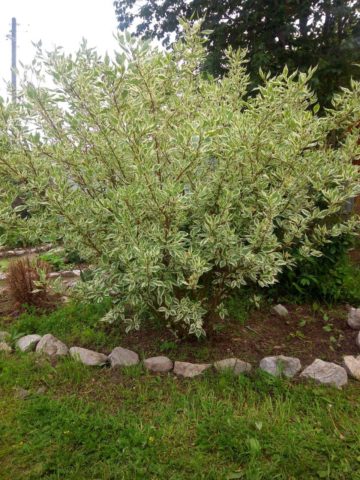
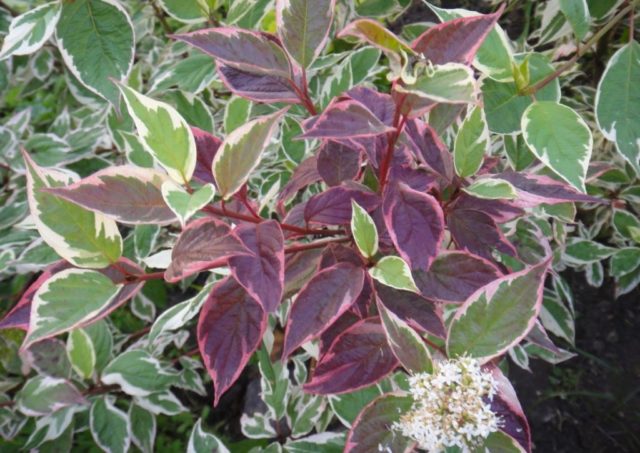
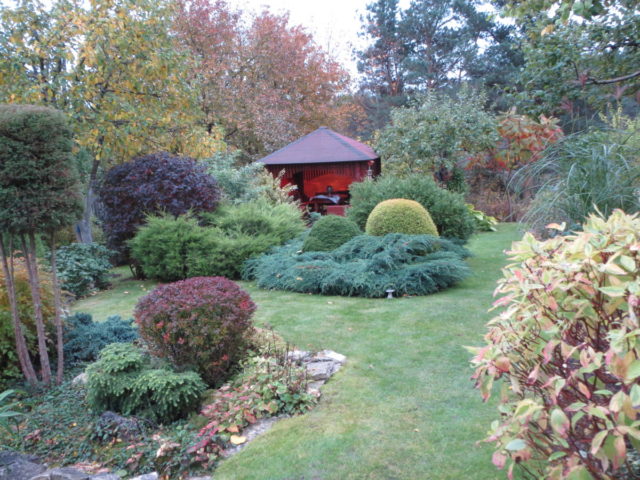
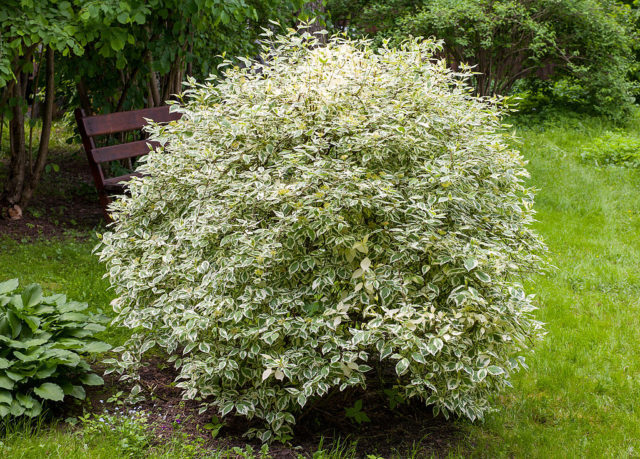
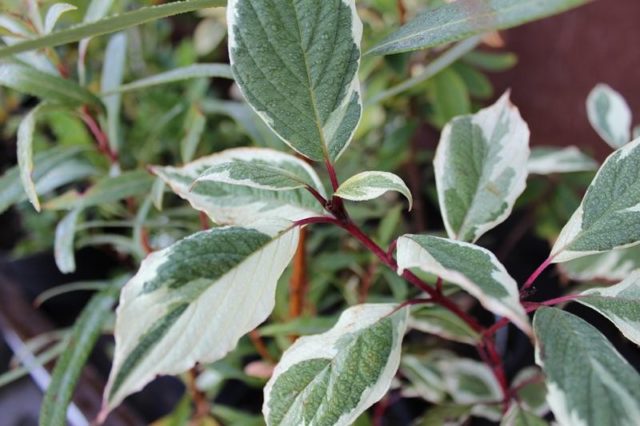
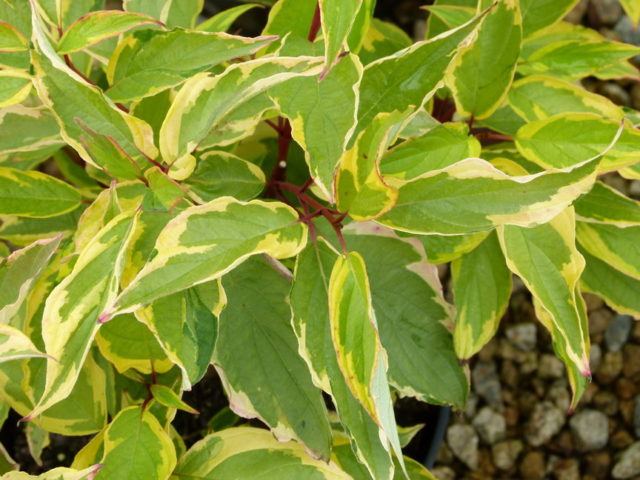
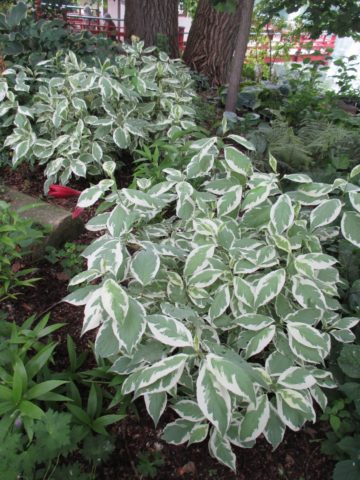
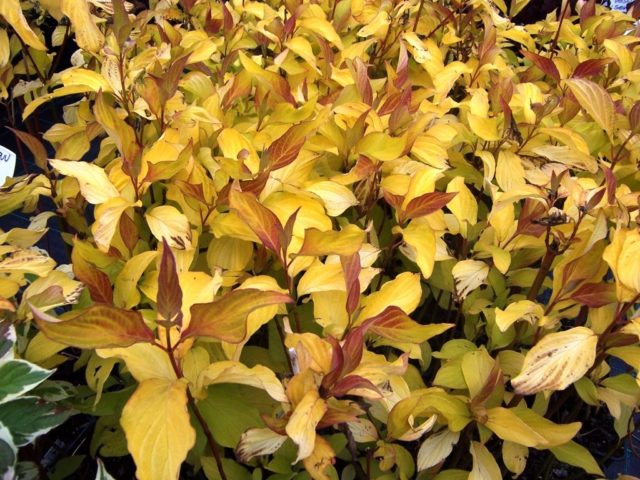
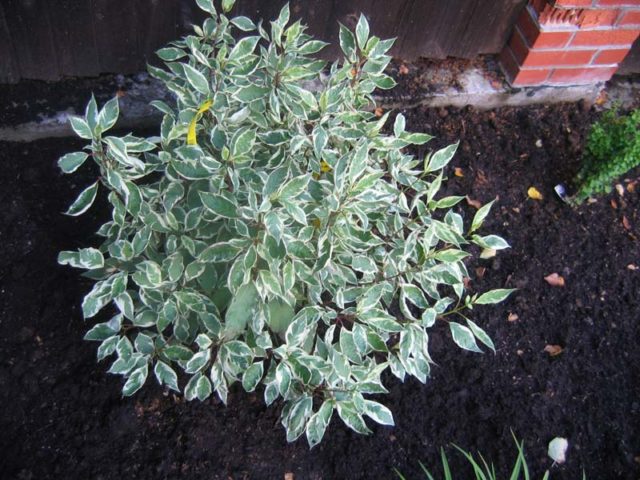
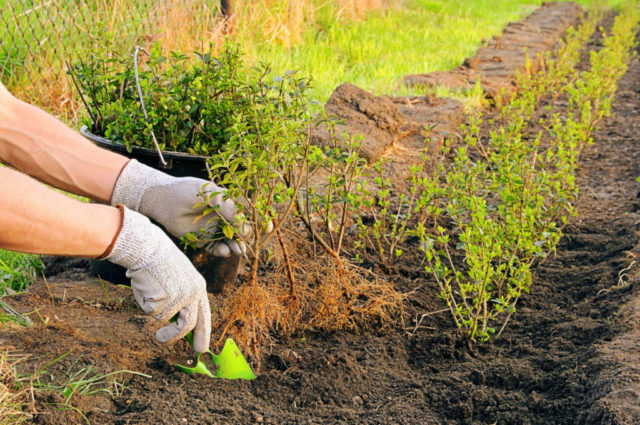
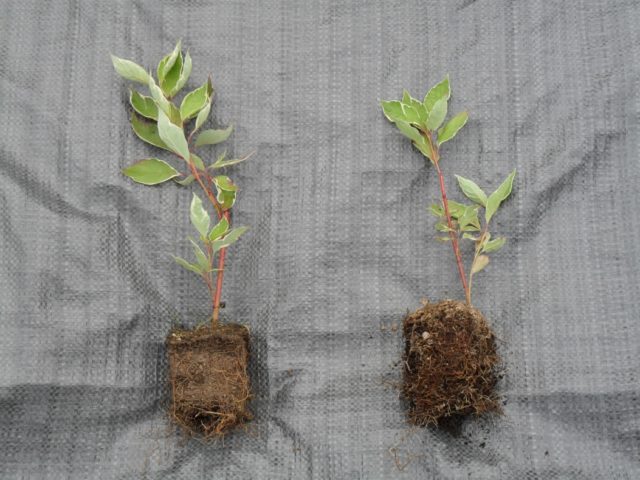
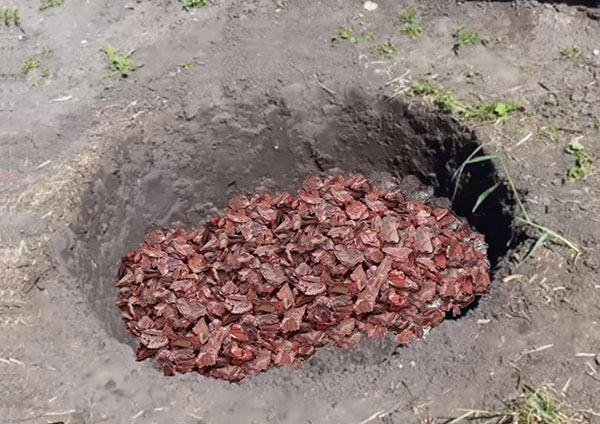
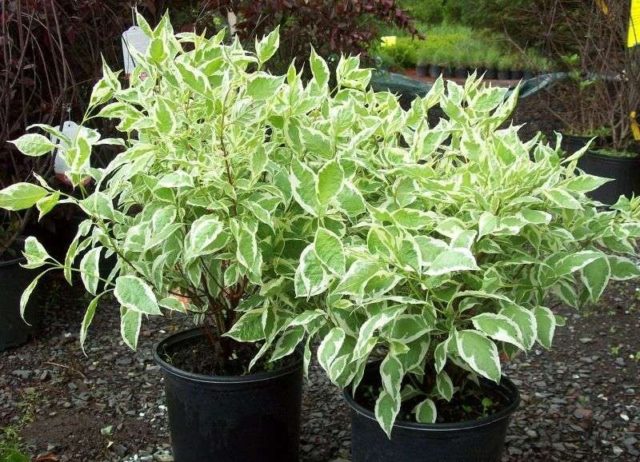
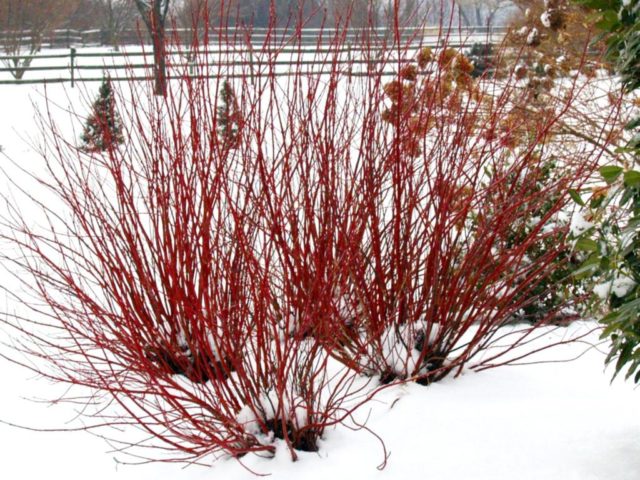
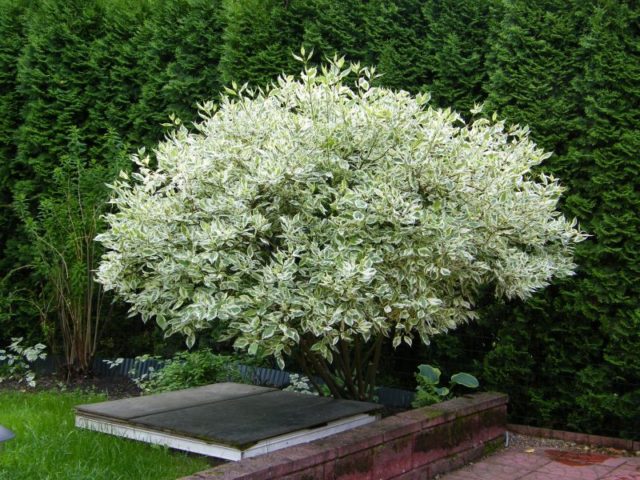
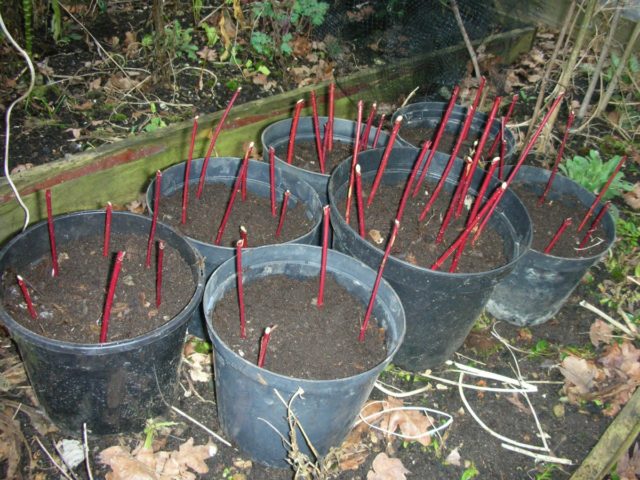
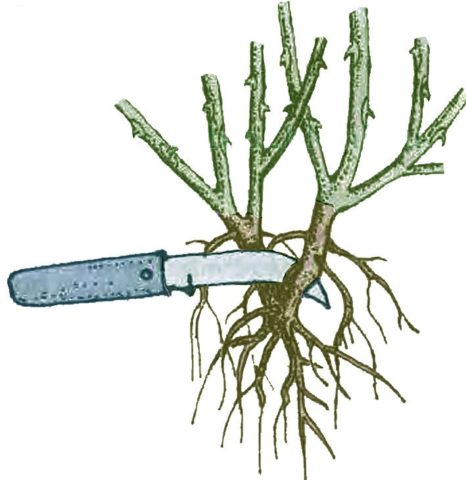
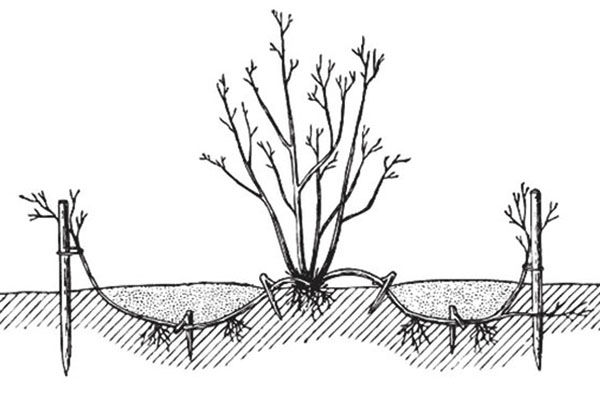
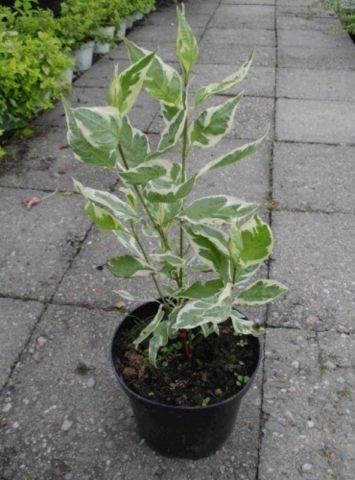
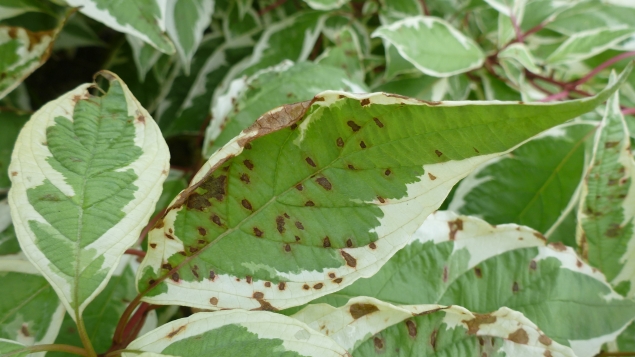
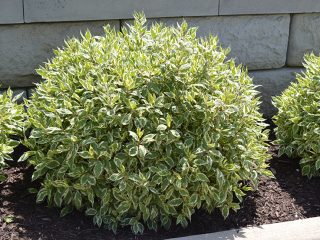
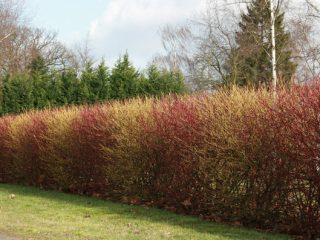
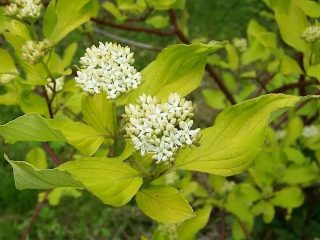
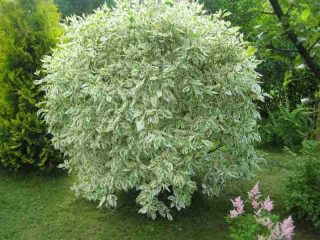
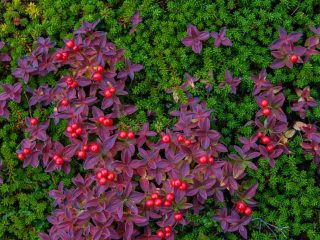
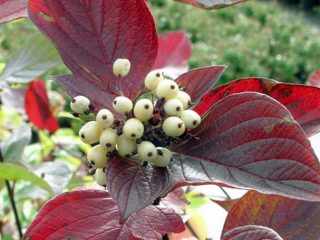
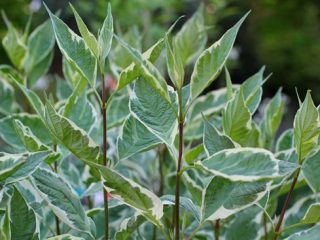
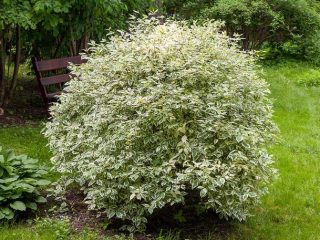
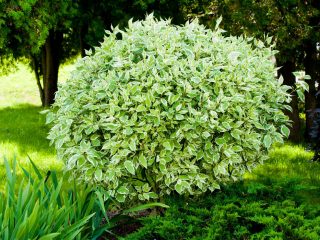
The leaves of a young derain bush have turned pink. Is it a disease, a variety, or is it missing something?
Good afternoon
In the second half of July - early August, the leaves of many tree varieties turn pink or purple, which indicates the approach of autumn. There is no need to worry in this case.
Thank you!